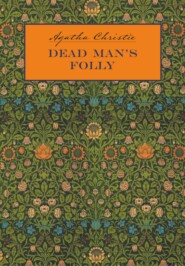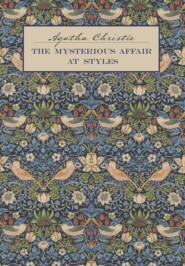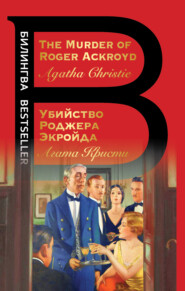По всем вопросам обращайтесь на: info@litportal.ru
(©) 2003-2024.
✖
Closed Casket: The New Hercule Poirot Mystery
Автор
Год написания книги
2019
Настройки чтения
Размер шрифта
Высота строк
Поля
‘You think it is not real, this will that leaves her entire estate to Scotcher?’ We had started to move again.
‘No, I think it is,’ I said. What did I mean? I considered it carefully. ‘Making it real is part of her game. She’s serious, all right—but that doesn’t mean she isn’t toying with everybody.’
‘For what reason, mon ami? For revenge, perhaps? The desire to punish—though not so severely as she might? A most interesting allusion was made to the late Viscount Playford’s will. I wonder …’
‘Yes, I have been wondering about it too.’
‘I think I can guess what happened. Usually the family estate passes to the son, the new Viscount. Yet in this instance that evidently did not happen. Lady Playford, as we heard this evening, is the owner of the Lillieoak estate and of several houses in London. Therefore … an unusual arrangement must have been made by the late Viscount Playford. It is possible that he and Lady Playford did not believe the young Harry to be capable of taking on such a responsibility—’
‘If that was their worry, one could scarcely blame them,’ I interjected. ‘Harry does rather give the impression of having a suet pudding between his ears, doesn’t he?’
Poirot murmured his agreement, then said, ‘Or perhaps the reluctance of Lady Playford and her late husband had more to do with their daughter-in-law, who has shown her vicious streak most clearly in the short time we have known her.’
‘What do you mean about Lady Playford wanting to punish, but not too severely?’
‘Let us say that she does not wish to disinherit her children—that would be too extreme. At the same time, it infuriates her that they take her for granted. Perhaps they are not as attentive as they might be. So she makes a new will leaving everything to Joseph Scotcher. She knows he will not outlive her—her new arrangements make no difference to him, apart from as a gesture. Now her children and her daughter-in-law will be nervous for the remainder of Scotcher’s life, in case she should happen to die before him—after all, accidents do happen. When Scotcher dies from his illness, they will all breathe a sigh of relief and never again take for granted that everything belonging to Lady Playford will one day be theirs. They might treat her more considerately thereafter.’
‘I don’t like that theory at all,’ I said. ‘Accidents do happen, and I cannot believe that Lady Playford would make so imprecise a plan. If she wanted her estate to go to her children, she would not take even the tiniest risk. As you say, she could fall down the stairs and break her neck tomorrow and everything would go to Scotcher.’
I expected Poirot to argue the point, but he did not. We walked for a while in silence. My legs were starting to ache from the effort of adjusting my pace to match his. Someone ought to make a competitive sport out of trying to walk excessively slowly; it tests muscles of which one was previously unaware.
‘I have an outlandish hypothesis,’ I said. ‘Imagine that Lady Playford has reason to believe one of her children intends to kill her.’
‘Ah!’
‘You’ve already thought of this, I suppose.’
‘Non, mon ami. Continue.’
‘She is worried about her dying secretary, Joseph Scotcher. As a sort of mother figure to him, which is very likely how she sees herself—he is an orphan, and she lost a child—she doesn’t want to die while he is alive and needs her. She hopes to stay alive in order to be of help and comfort to him during his final illness. At the same time, she knows her power is limited; if Harry or Claudia—or Dorro or Randall Kimpton for that matter—is serious about killing her, she might not be able to prevent it.’
‘So she changes her will to ensure that her would-be killer waits until Scotcher is dead before killing her?’ said Poirot.
‘Yes. She calculates that they would wait, in order to make sure of getting their hands on her money, the houses, the land. Exactly. And after Scotcher is dead, why should she care if she lives or dies? Her husband has already passed on, and losing Scotcher will be like losing a child all over again.’
‘Why would Lady Playford not go to the police if she believed her life was in danger?’
‘That is a good point. Yes, she would, most probably. Which makes my exciting theory pure bunkum.’
I heard a little laugh beside me. Poirot, like Athelinda Playford, enjoyed playing games with people. ‘You give up too easily, Catchpool. Lady Playford is not a young woman, as we have discussed. Many at her age do not like to travel. So, she did not go to the police. Instead, she brought the police to her. You, mon ami. And she did better than that: she brought to her home the great detective Hercule Poirot.’
‘You think there is something in my hypothesis, then?’
‘It is possible. It would be hard for a mother to say of one of her children, “He plans to kill me,” especially to a stranger. She might try instead to push away the unbearable truth and approach the matter in a less direct fashion. Also, she may be unsure; she may lack the proof. Did you notice any interesting reactions to the news of the changed will?’
‘Knocked everyone for six, didn’t it? Caused a great to-do, and I doubt we’ve heard the end of it either.’
‘Not everyone seemed knocked for the six,’ Poirot said.
‘Do you mean Harry Playford? Yes, you’re right. He appeared equally unmoved by his wife’s distress, by her cruel words about his dead brother, Nicholas, and by his mother’s anguished departure that followed. I should say that Harry Playford is an even keel sort of fellow who could find himself at the centre of an earthquake and barely notice. He strikes me as neither bright nor sensitive. I mean … gosh, that sounded rather harsher than I intended it to!’
‘I agree, mon ami. So we can put to one side for the time being Harry Playford’s unusual reaction and say that it is probably not unusual for him. I suspect that he has come to rely on his wife to express all the emotion for the two of them.’
‘Yes, Dorro does enough fretting for twelve people,’ I concurred. ‘You asked about unusual reactions—I don’t suppose you noticed Gathercole’s? He seemed to be struggling to contain some terrible grief or fury that threatened to burst forth. There was a moment, I confess, when I feared his efforts would fail and it would all come out, whatever it was.’
‘You describe it very well,’ said Poirot. ‘However, it was not the announcement of the new will that upset Mr Gathercole. Remember, he had known for some hours and was perfectly composed when we all sat down at the table. So what altered his mood?’
‘I’ve been puzzling over that very question,’ I said. ‘What happened that he might not have been prepared for? I suppose Scotcher’s reaction was unexpected: he did not seem glad of the new arrangements at all, did he?’
‘Understandably, he did not. Scotcher is close to death. What can he gain from this new will? Nothing. He will not live to see the money, so it spells only trouble for him—resentment from Dorro, from Claudia … which is why I wonder.’
‘What do you wonder?’
‘Lady Playford’s intention—perhaps it is not to benefit Scotcher but to incommode him. To cause him distress and inconvenience. That, after all, is the effect that we observed, and Lady Playford seems to be a person whose aim would not miss.’
‘What if she and Joseph Scotcher have jointly concocted some kind of plot?’ I said.
‘Why do you suggest it?’ asked Poirot. We had reached the far side of the lawn, the spot that offered the best view of Lillieoak. People were supposed to stop here and admire the house.
‘Oh, I don’t know. It’s only that their behaviour struck me as similar somehow. Lady Playford leaves everything to a dying man who will not benefit from her generosity. Joseph Scotcher proposes marriage to a girl who, if she accepts him, will get deathbed duty instead of the romantic dream, before becoming a widow. In both cases, the promise of everything—one’s dreams come true—but a vastly different and more desolate reality.’
‘That is an interesting observation,’ said Poirot as we walked on. ‘Yet I can imagine the desire to marry the one you love growing more urgent as life departs. There is great consolation in the symbolic union.’
‘What if Nurse Sophie ends up with the lot?’ I said.
‘While I think of the grand romantic gestures, you think of practicalities, n’est-ce pas?’
‘You have not considered it? If he marries her, and Lady Playford dies before he does, to whom would her estate go? To Sophie, as Scotcher’s wife.’
‘Catchpool. What is that noise?’
We stopped. It seemed to be coming from the bushes to our right: the distinct sound of a person weeping that soon gave way to an intermittent hissing noise.
‘What on earth is that?’ I asked Poirot.
‘Frenzied whispering. Lower your voice, or they will hear us, if they have not already.’
It was obvious as soon as he said it that the hissing I had heard was the sound of a frightened person trying to communicate quietly but urgently.
‘There must be two of them out here,’ I whispered. ‘Shall we look for them?’
‘In these gardens?’ Poirot made a dismissive noise. ‘It would be more profitable to look for a particular leaf—the first one you saw when you arrived here.’
‘People are easier to find than leaves,’ I said.
‘Not when you and I are strangers to these paths and others are not. No, we will return to the house. There is work for us to do. We must make ourselves busy. Once we are inside, we will be able to see who is there and who is not. That is more productive than looking for the needle in the hay.’
‘What did you mean about us having work to do?’ I asked. ‘What sort of work?’

















